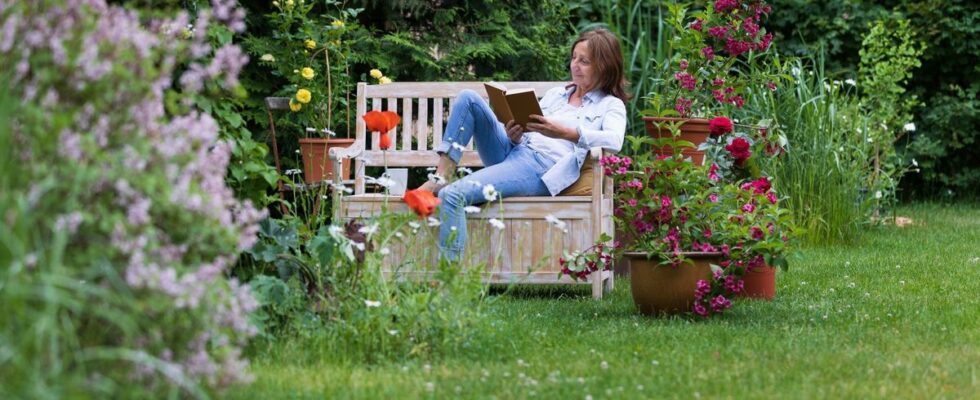Published on
updated on
Reading 3 min.
Planting wild flowers, not mowing frantically or putting up shelters for insects and birds: more and more individuals are saying stop to the model of the uniform and ultra-domesticated garden to contribute to the return of bees, butterflies and other living beings.
With one million private gardens in France, covering 1.2 million hectares, according to INSEE, there is a “great potential to do something about biodiversity loss“, says Isabelle Bouchy, president of the Val de Seine club of the departmental association of gardeners of Essonne.
“This is four times the surface area of natural parks in France.“, so if each of the 58% of French people who have a private garden”getting involved in this, even a little bit, creates an extraordinary lever” explains this sixty-year-old, who organizes visits several times a year to raise awareness of the extraordinary powers of gardens.
On the small plot of land surrounding her house, Mrs Bouchy has created different spaces to encourage biodiversity: a vegetable garden, flower plantations, a lawn with a garden furniture set, but also wilder areas, trees and bushes, a very small pond.
“This garden is not perfect, but I am making progress. It is often about small things.” that can change everything.
“I feel nature suffering, the decline in the number of butterflies, the fact that there are fewer and fewer trees, the plants dying because of the drought. (…) So I said to myself: +What can I do at my level, at home?+“.
Down with the lawnmower?
For the one who was reluctant “to let the clutter settle in“, it was not easy.”I had to change (…) my vision of gardening“.
Like her, many individuals fear finding themselves “in the middle of a jungle” if they let nature take over.
According to a 2022 survey by Swedish equipment manufacturer Husqvarna of 4,000 homeowners in eight European countries, biodiversity is a “top priority” for only 22% of them and 80% admit they do not know how to take it into account.
Only 30% left patches of weeds, while 50% remain fans of a nice green, closely-cut lawn, leaving no chance for grasses and only a brief respite for clovers and daisies before the quick return of an overzealous lawnmower.
In response, Plantlige, a British association, has been running a #NoMowMay campaign for five years to let wildflowers flourish and thus provide food for pollinators, which are threatened with extinction.
Mrs. Bouchy mows her lawn “in stages” and never right down to the ground.When you mow it too much, the lawn suffers much more, it cannot regenerate and it dries out more. So I leave (…) places where it is 10-15 cm, and it is not at all inconvenient to walk, to live there“.
Ecological corridors
For the rest, no need to revolutionize your garden.
In addition to giving up phytosanitary products, which have been banned in France for private gardens since 2019, simple things can make a difference: planting “wild plants provide stages for insects, recreate small ecological corridors“, to leave ““a small pile of dead wood” offers them shelter and “leaving a small part of the garden that remains a little wild, that’s enough” Also.
“It could be just a meter or two.“wide,” explains Ms. Bouchy, “and for aesthetics, because”This is often what holds people back.“, all you need is a small barrier, stones or colored stakes.
Another little-known advantage of a more natural garden: it reduces greenhouse gas (GHG) emissions, by transforming lawns into vegetable gardens, offering vegetables with a better carbon footprint than those sold commercially, according to a study conducted in 2016 by David Cleveland of the American University of Santa Barbara.
Furthermore, “Gentle gardening, maintenance and ecological management techniques limit the release of carbon into the atmosphere“, underlines the League for the Protection of Birds (LPO).
Hedges or a shrub on a balcony”not only provide shelter and food for wildlife but also help the climate through their ability to store carbon through photosynthesis“, recalls the LPO.
